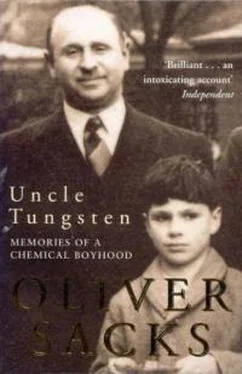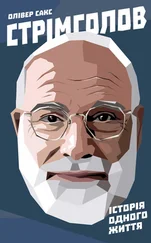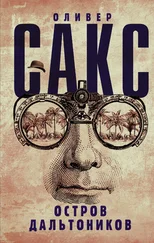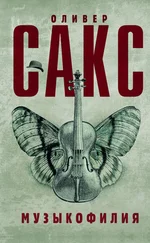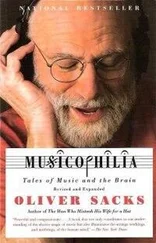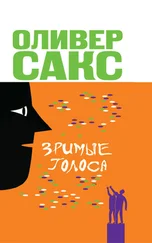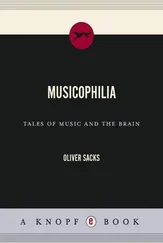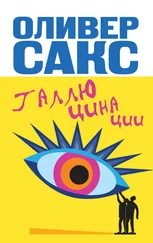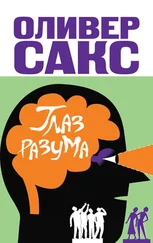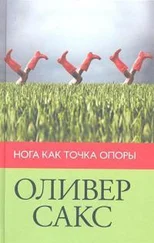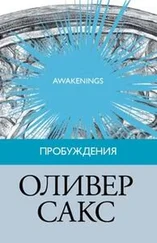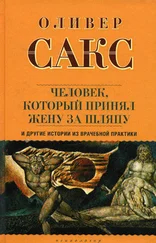* * *
Her Hebrew name was Zipporah (‘bird’), but to us, to the family, she was always Auntie Birdie. It was never quite clear to me (or perhaps anyone) what had happened to Birdie in early life. There was talk of a head injury in infancy, but also of a congenital disorder, a defective thyroid gland, and she had to take large doses of thyroid extract throughout her life. Birdie had somewhat creased and folded skin, even as a young woman; she was of small stature and modest intelligence, the only one so handicapped among the otherwise gifted and robust children of my grandfather. But I am not sure that I regarded her as ‘handicapped’; to me she was just Auntie Birdie, who lived with us, was an essential part of the house, always there. She had her own room, next to my parents’ room, filled with photos, postcards, tubes of colored sand, and knickknacks from family holidays going back to the beginning of the century. Her room had a clean, almost puppylike smell and was an oasis of calm for me, sometimes, when the house was in an uproar. She had a fat yellow Parker pen (my mother had an orange one), and wrote slowly in an unformed, childlike hand. I knew, of course, that there was ‘something wrong’ with Birdie, something medically the matter, that her health was fragile and her powers of mind limited, but none of this really mattered, or was relevant to us. We knew only that she was there, a constant presence, unwaveringly devoted, and that she seemed to love us without ambivalence or reservation.
When I became interested in chemistry and mineralogy, she would go out and get small mineral specimens for me; I never knew where or how she got these (nor how, after asking Michael what book I might like for my bar mitzvah, she got me a copy of Froissart’s Chronicles ). As a young woman, Birdie had been employed by the firm of Raphael Tuck, which published calendars and postcards, as one of an army of young women who painted and colored the cards – these delicately colored cards were very popular, and often collected, for decades, and seemed a permanent part of life until the 1930 s, when color photography and color printing started to displace them, and to render Tuck’s small army of women superfluous. In 1936, after almost thirty years of working for them, Birdie was dismissed one day, with no warning and scarcely a ‘thank you’, let alone a pension or severance pay. When she came back that evening (Michael told me years later) her face was ‘stricken’, and she never quite got over this.
Birdie was at once so quiet, so unassuming, so ubiquitous, that we all tended to take her for granted and to overlook the crucial role she played in our lives. When, in 1951, I got a scholarship to Oxford, it was Birdie who gave me the telegram, and hugged and congratulated me – shedding some tears, too, because she knew this meant that I would be leaving home.
Birdie had frequent attacks of ‘cardiac asthma’, or acute heart failure, in the night, when she would get short of breath, and very anxious, and need to sit up. This sufficed at first for her milder attacks, but as they grew more severe, my parents asked her to keep a little brass bell by her bedside and to ring it as soon as she felt any distress. I would hear the little bell ring at increasingly frequent intervals, and it started to dawn on me that this was a serious condition. My parents would get up at once to treat Birdie – she needed oxygen now, and morphine, to get her through her attacks – and I would lie in bed, listening fearfully until all was calm again and I could return to sleep. One night, in 1951, the little bell rang, and my parents rushed into the room. Her attack, this time, was extremely severe: pink froth was coming out of her mouth – she was drowning in the fluid that had welled into her lungs – and she did not respond to the oxygen and morphine. As a final, desperate measure to save her life, my mother performed a venesection with a scalpel on Birdie’s arm, in an attempt to relieve the pressure on the heart. But it did not work with Birdie, and she died in my mother’s arms. When I entered the room, I saw blood everywhere – blood all over her nightdress and arms, blood all over my mother, who was holding her. I thought for a moment that my mother had killed her, before I deciphered the fearful scene before me.
It was the first death of a close relative, of someone who had been an essential part of my life, and it affected me much more deeply than I had expected.
* * *
As a child, it seemed to me that the house was full of music. There were two Bechsteins, an upright and a grand, and sometimes both were being played simultaneously, to say nothing of David’s flute and Marcus’s clarinet. At such times the house was a veritable aquarium of sound, and I would become aware of one instrument and then another as I walked about (the different instruments did not seem to clash, curiously; my ear, my attention, would always select one or another).
My mother was not as musical as the rest of us, but very fond, nonetheless, of Brahms and Schubert lieder; she would sing these, sometimes, with my father accompanying her at the piano. She was especially fond of Schubert’s ‘Nachtgesang’, his Song of the Night, which she would sing in a soft, slightly off-key voice. This is one of my earliest memories (I never knew what the words meant, but the song affected me strangely). I cannot hear this now without recalling with almost unbearable vividness our drawing room as it was before the war, and my mother’s figure and voice as she leaned over the piano and sang.
My father was very musical, and would come back from concerts and play much of the program by ear, transposing fragments into different keys, playing with them in different ways. He had an omnivorous love of music, and enjoyed music halls as much as chamber concerts, Gilbert and Sullivan as much as Monteverdi. He was particularly fond of songs from the Great War, and would sing these in a resounding bass. He had a large library of miniature scores, and always seemed to have one or two of these in his pockets (and indeed he usually went to bed with one of them, or the dictionary of musical themes that I gave him later for one of his birthdays).
Though he had studied with a noted pianist, and was always darting to the keyboard of one or the other of the pianos, my father’s fingers were so broad and stubby that they could never fit quite comfortably on the keys, so he usually contented himself with impressionistic fragments. But he was eager for the rest of us to be at home on the piano, and engaged a brilliant piano teacher, Francesco Ticciati, for us all. Ticciati drilled Marcus and David in Bach and Scarlatti with passionate, demanding intensity (Michael and I, younger, would play Diabelli duets), and at times I would hear him bang the piano with frustration, shouting, ‘No! No! No!’ when they failed to get things right. Then he would sit down sometimes and play himself, and suddenly I knew what mastery meant. He instilled in us an intense feeling for Bach especially, and all the hidden structure of a fugue. When I was five, I am told, and asked what my favorite things in the world were, I answered, ‘smoked salmon and Bach.’ (Now, sixty years later, my answer would be the same.)
I found the house somewhat stark, musicless, when I returned to London in 1943. Marcus and David, pre-med students now, were themselves evacuated – Marcus to Leeds, David to Lancaster; my father was busy, when not seeing patients, with his duties as an air-raid warden; my mother equally so, doing emergency surgery late into the night at a hospital in St. Albans. I would wait up, sometimes, to hear the sound of her bicycle bell, as she cycled back, close to midnight, from the Cricklewood station.
Читать дальше
